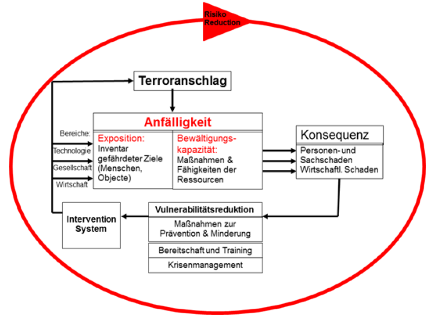The objective of the project is to analyze the vulnerability of the rail-bound GE-FR high-speed train system (ICE, TGV) as a part of critical infrastructure “Transport” in view of threats from terrorism as well as the derivation of measures for the improvement of their resilience.
Resilience is here understood to be the ability of the high-speed system to maintain central functions and system states during and after the impact of threats and to quickly restore impaired functions.
The improvement of the resilience is aided by:
- Defensive measures against threats
- Adjusting the safety requirements to changing threats
- Reducing the vulnerability
- Preparation for the rapid and sustainable coping with the consequences of an attack by the flexible and efficient use of the intervention system.

Exposition describes risk elements (persons, objects and facilities) which are exposed to danger in time and space.
Susceptibility means that an exposed element is susceptible to damage in the case of the occurrence of an event (attack).
Coping capacity is counteracting the consequences of an attack using existing opportunities and resources.
The analysis has been realized by a scenario-based comprehensive approach, for which a wide spectrum of potential terrorist attacks on targets of the GE-FR high-speed train system (trains, infrastructure, humans) is analyzed. Furthermore, it is being studied, with which security measures the prevention can be improved as well as the consequences of an attack can be mitigated.